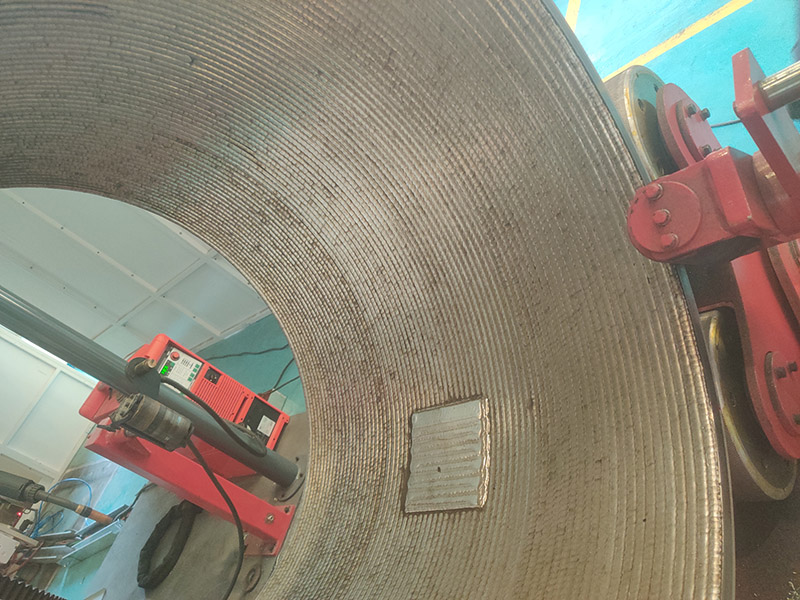PRODUCT DETAILS
In heavy-duty industries such as rolling mills, marine propulsion, hydroelectric plants, and large generators, journal bearings are the backbone of rotating equipment. To withstand extreme loads, shock impacts, and continuous operation, Babbitt alloy cladding is widely applied as a protective lining. By combining a steel backing shell with a Babbitt alloy lining, manufacturers achieve the perfect balance between structural strength and low-friction, long-lasting performance.
At FNS, we deliver large-diameter journal bearings with Babbitt alloy cladding that provide superior durability, reduced downtime, and reliable service life for the world’s most demanding applications.
Why Choose Babbitt Alloy Cladding?
Unlike rolling bearings, Babbitt-lined journal bearings excel in applications where hydrodynamic lubrication creates a stable oil film, ensuring metal-to-metal contact is avoided even under extreme pressures. This design ensures:
- Hydrodynamic Lubrication Efficiency – Oil films isolate shaft and lining, preventing wear.
- Exceptional Load Capacity – Babbitt cladding withstands loads 5–10 times higher than rolling bearings, ideal for shock loads in the hundreds of tons.
- Thermal Stability – Reliable performance at temperatures up to ~120°C without film breakdown.
- Long Service Life – Reduced risk of seizure and extended operation with minimal maintenance.
Forming Process & Materials
FNS applies automated centrifugal casting and precision arc cladding technology to achieve a uniform Babbitt alloy layer, ensuring excellent metallurgical bonding and precise dimensional control.
- Size Range: Diameters up to 2,500 mm, lengths up to 2,000 mm
- Base Material: High-strength carbon steel, cast steel, or alloy steel shells
- Cladding Material: Tin- or lead-based Babbitt alloys (ASTM Grade 2/3)
- Surface Finish: Smooth, low-friction surface ideal for stable oil film formation
Babbitt Alloy vs. Rolling Bearings – A Comparison
| Feature | Babbitt Alloy Clad Journal Bearings | Rolling Bearings |
|---|---|---|
| Load Capacity | 5–10× higher, withstands shock loads | Limited under heavy impact |
| Friction Under Hydrodynamic Film | Very low (stable oil film) | Higher under load |
| Service Life | Long, with proper lubrication | Shorter under shock/vibration |
| Temperature Range | Up to ~120°C continuous | Typically lower |
| Applications | Turbines, marine, hydro plants | General machinery |
Applications of Large-Diameter Babbitt Bearings
| Industry / Equipment | Application Benefit |
|---|---|
| Power Generation (Turbines, Generators) | Stable operation under high rotational speeds |
| Marine Propulsion Systems | Reliable under seawater and shock load conditions |
| Hydroelectric Plants | Long-term durability in high-load turbines |
| Rolling Mills & Steel Plants | Withstands shock loads and continuous high stress |
| Compressors & Pumps | Extended uptime and reduced maintenance cycles |

Babbitt Alloy Cladding for Large-Diameter Journal Bearings
Product Features
- Excellent bearing performance under dynamic loads and high rotational speeds
- Outstanding anti-seizure properties, reducing startup and shutdown risks
- High bonding strength and uniform cladding thickness through controlled processes
- Smooth, low-friction surface ideal for hydrodynamic lubrication stability
- Custom groove machining available for optimized lubrication and cooling
FNS Capacity & Quality Assurance
FNS operates multiple sets of large-scale centrifugal casting and cladding equipment, with annual capacity exceeding 500 tons. Every bearing undergoes strict quality control, including NDT (Non-Destructive Testing), to ensure bonding integrity and reliability.
- Compliance with ASTM, ISO, and EN standards
- Proven performance in marine, power, and industrial projects worldwide
- Flexible customization for size, material, and groove designs
FAQ – Babbitt Alloy Journal Bearings
- Q1: What is Babbitt alloy cladding and why is it used in journal bearings?
A: It’s a protective lining applied to steel shells, providing low-friction operation, excellent embeddability, and long service life in heavy-duty bearings. - Q2: What are the temperature limits of Babbitt alloy bearings?
A: Typically up to 120°C continuous operation, depending on lubrication and alloy grade. - Q3: How does centrifugal casting improve cladding quality?
A: It ensures uniform thickness, strong metallurgical bonding, and eliminates defects such as pores or inclusions. - Q4: Can FNS provide customized journal bearings for hydroelectric or marine projects?
A: Yes, we customize diameter, length, alloy grade, and groove machining to meet client-specific requirements.
Looking to enhance the performance and reliability of your large-diameter journal bearings?
👉 Contact FNS today for customized weld cladding solutions, designed to reduce downtime, extend service life, and maximize efficiency in your heavy-duty operations.


